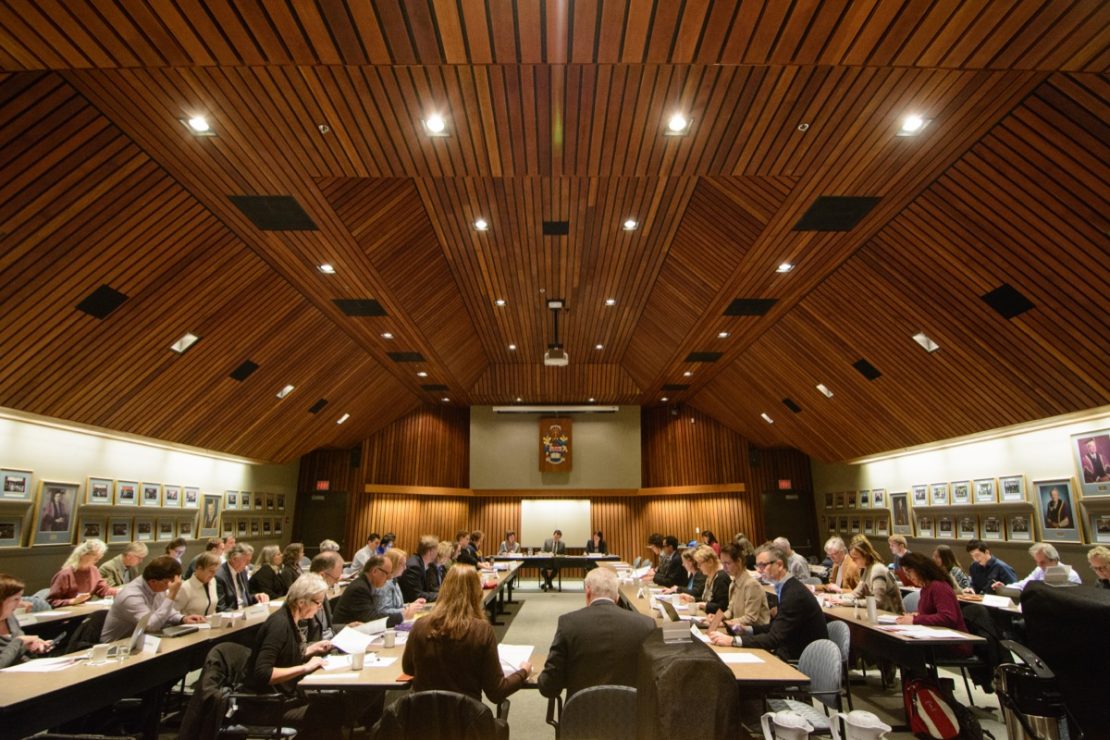
UVic Senate was busier than usual during their April 7 meeting, approving a number of new programs and initiatives. File photo by Hugo Wong/The Martlet
Though the talk of the campus following the UVic Senate meeting on April 7 was a proposal allowing STEPS Forward students to participate in convocation, a number of other motions were put forward that will have their own impact on the UVic academic community for years to come.
UVic program offerings expanded
The Senate voted to establish minor programs in Theatre and Museum Studies, as well as a Bachelor of Science with an Anthropology major. It also formally approved the establishment of a Department of Indigenous Education as part of the larger Faculty of Education, which has been in the works for a number of years.
The new department will provide a formal structure for Indigenous education courses that are already offered by the faculty. Speaking with Dr. Onowa McIvor after the department was given faculty approval in January this year, she said the department “can only mean great things for Indigenous world-views, ways of being, and forms of teaching” at UVic.
On a similar front, the UVic Senate voted to approve a joint Juris Doctor/Juris Indigenarum Doctor program within the Faculty of Law. Jeremy Webber, Dean of Law, said the program is “unprecedented” and “unique in the world,” and was introduced following a “long history of engagement with Indigenous issues within the faculty.”
As per the proposal, students would be trained in both common law (JD) and North American Indigenous legal orders (JID) over the course of four years — one year longer than the regular JD program. The joint JD/JID program would provide all the skills of a normal JD program, as well as the skills necessary to “access Indigenous law, reason with it, function within Indigenous institutions, build new institutions drawing upon Indigenous law, and work at the boundaries between Indigenous and non-Indigenous legal orders.”
While JD/JID students will comprise a distinct cohort, the proposal says the curriculum has been designed to foster interaction between JD/JID students and straight JD students, “thus enriching the experience of both.”
New guidelines clarify privacy issues
Guidelines around the use of educational technology in the classroom will be a lot clearer for students and instructors from now on, after the Senate also approved new additions to the Undergraduate Academic Calendar.
The additions are written to ensure that instructors follow the legal requirements of the Freedom of Information and Protection of Privacy Act (FIPPA), and to empower students to give consent for the use of their private information.
As per Section 30.1 of FIPPA, UVic is required to ensure that students’ personal information is stored and accessed only in Canada. However, some educational technologies, which can include programs as common as Google Docs, Dropbox, and Facebook, store users’ personal info outside of Canada.
This isn’t a problem on its own, as FIPPA does permit out of Canada storage and access of user data, but only as long as an individual gives consent. That’s where the proposed policy comes in.
“In the calendar, there’s no information about students’ opportunities to use innovative technology in the learning environment . . . and just acknowledging that the university as a public institution has to protect the custody and transmission of student data,” said Dr. Janni Aragon, who sits on the Senate Committee on Learning and Teaching, in an interview following the April 7 Senate meeting.
“Part of [the calendar additions] is ensuring that those of us who are employees of the university . . . are in compliance with the law,” Aragon said.
The additions, which were approved by the Senate after some back and forth discussion, outline a consent process that instructors can follow to ensure students make fully informed decisions. Should a student choose not to partake in a project or assignment that requires personal information to be stored or accessed outside Canada, then an alternative will be provided.
Some senators raised issue with that last clause; Dr. Aaron Devor asked, “If we offer an alternative, what if the student doesn’t take it?”
Bill Trott, chief privacy officer, responded: “It has to be a reasonable alternative, but our obligation goes as far as providing the alternative.”
The motion was ultimately carried with a handful of senators opposed.







